What Are the Benefits of Aromatherapy Diffusers
Looking to de-stress, improve sleep, or boost your mood? Aromatherapy diffusers might just be the answer you’re looking for!
In this article, we’ll explore what aromatherapy is, the different types of diffusers available, how they work, and the numerous benefits they offer.
From promoting relaxation and relieving respiratory issues to enhancing cognitive function and supporting the immune system, aromatherapy diffusers have a lot to offer.
We’ll also discuss how to use them safely and the best essential oils to use for maximum benefits. So, sit back, relax, and let’s dive into the world of aromatherapy diffusers!
Key Takeaways:
What is Aromatherapy?
Aromatherapy is a holistic healing treatment that uses natural plant extracts, known as essential oils, to promote physical and emotional well-being. These oils are derived from various parts of plants and are highly concentrated to capture their aromatic essence.
Essential oils have been used for centuries in different cultures for their therapeutic properties. The practice of aromatherapy dates back to ancient civilizations like Egypt, Greece, and China, where these aromatic substances were revered for their healing effects. In modern times, aromatherapy has evolved into a popular complementary therapy that is often used in conjunction with conventional medicine.
The core principle of aromatherapy is the belief that the inhalation or topical application of these essential oils can stimulate the olfactory system and influence the brain’s limbic system, which is responsible for emotions, behavior, and memory. By targeting these areas, aromatherapy aims to promote relaxation, reduce stress, improve mood, and enhance overall well-being.
What are Aromatherapy Diffusers?
Aromatherapy diffusers are devices that disperse essential oils into the air, allowing for inhalation or topical use to experience the benefits of aromatherapy. These diffusers come in various types and designs to suit different preferences and needs.
Ultrasonic diffusers are one common type that uses water and ultrasonic vibrations to create a fine mist of essential oils. This gentle method preserves the oil’s properties and helps to humidify the air.
On the other hand, nebulizing diffusers do not require water and disperse pure essential oil directly into the air, making them more potent but also more intense.
Heat diffusers, such as candle or electric heat diffusers, use heat to evaporate the oil, while evaporative diffusers rely on a fan to blow air through a pad soaked in essential oils. Each type has its unique way of dispersing the oils, catering to different preferences and needs.
What are the Different Types of Aromatherapy Diffusers?
Aromatherapy diffusers come in a variety of types, including reed diffusers that use wooden sticks to diffuse oils, electric diffusers that vaporize oils for inhalation, ultrasonic diffusers that produce a fine mist using water and oil, candle lamp diffusers that heat oils gently, terracotta diffusers that absorb and release oils, and room mist diffusers that spray a fine mist of oils into the air.
Reed diffusers are perfect for subtle, continuous diffusion in smaller spaces, like bathrooms or closets, as they don’t require any power source.
Electric diffusers are more versatile and efficient, often equipped with settings to control intensity and duration of diffusion.
Ultrasonic diffusers are popular for their ability to double up as humidifiers, ideal for larger rooms.
Candle lamp diffusers offer a cozy ambiance along with aromatherapy benefits.
Terracotta diffusers are great for those who prefer natural materials, adding a touch of earthiness to the aroma.
Room mist diffusers, on the other hand, can quickly refresh a room’s atmosphere.
How Do Aromatherapy Diffusers Work?
Aromatherapy diffusers work by dispersing essential oils into the air through various methods such as evaporation, heat, or ultrasonic vibrations. These oils are then inhaled or absorbed, allowing their therapeutic properties to positively impact the body and mind.
The process of evaporation involves breaking down the essential oils into tiny molecules, which are then released into the air as a fine mist. This mist can be easily inhaled, allowing the molecules to enter the respiratory system and reach the bloodstream. Heat-based diffusers work by heating the essential oils to create a vapor that disperses throughout the room. Ultrasonic diffusers use vibrations to break down the oils into micro-particles, creating a fine mist that lingers in the air for an extended period.
What Are the Benefits of Aromatherapy Diffusers?
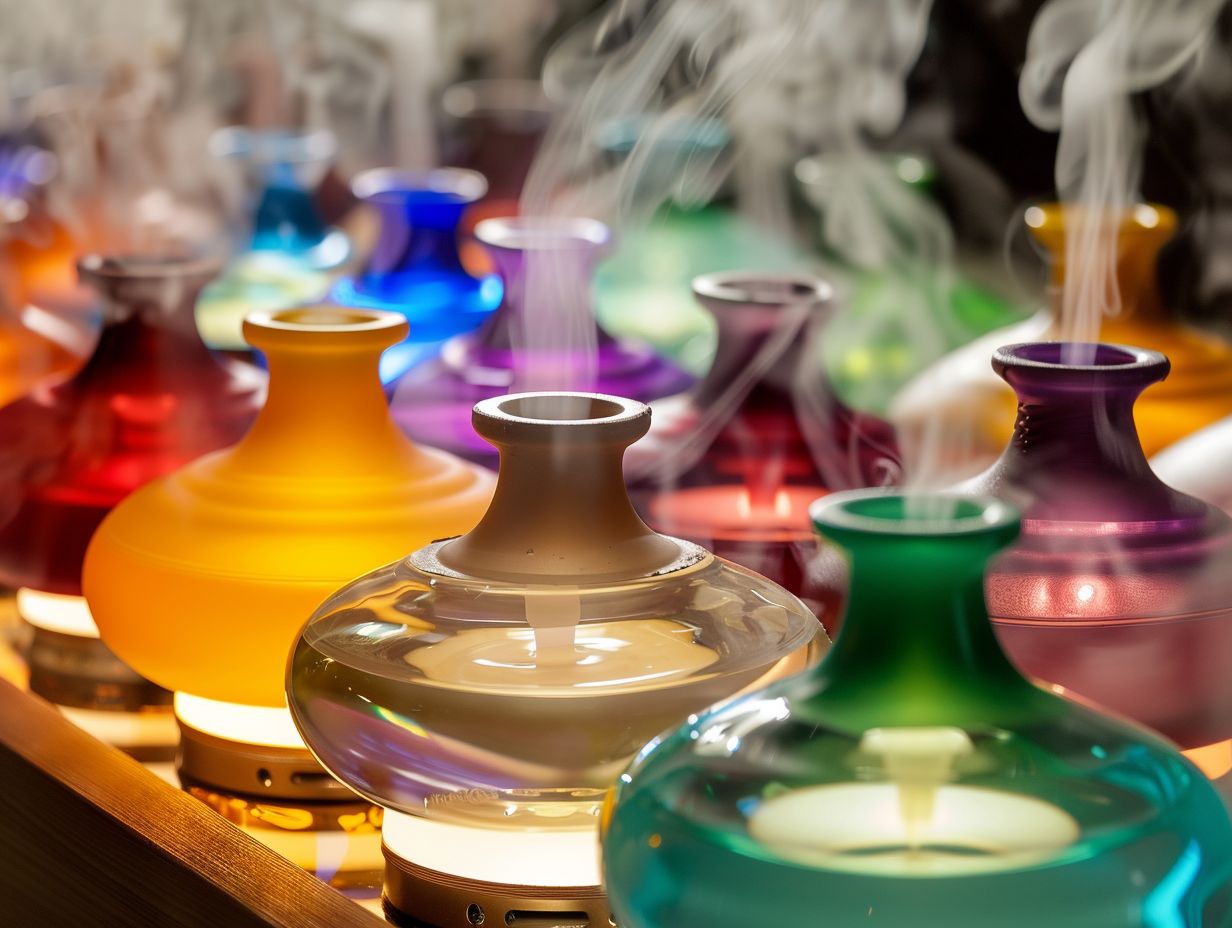
One of the key advantages of utilizing aromatherapy diffusers is their ability to create a serene environment, perfect for unwinding after a long day or setting the mood for a peaceful night’s rest. The soothing scents emitted by these devices can help calm the mind, reduce feelings of tension, and induce a state of tranquility that is conducive to relaxation.
The use of essential oils in diffusers can have a direct impact on mental well-being by uplifting mood, easing feelings of depression or anxiety, and promoting emotional balance. Discover more about aromatherapy physical benefits.
Plus their mental health benefits, aromatherapy diffusers can also improve physical health by purifying the air, boosting immunity, and providing relief from respiratory issues such as congestion or allergies.
Promotes Relaxation and Reduces Stress
One of the key benefits of aromatherapy diffusers is their ability to promote relaxation and reduce stress levels. Inhaling calming essential oils can have a soothing effect on the mind and body, contributing to overall well-being and emotional balance.
Some popular essential oils used in aromatherapy for relaxation and stress reduction include:
- Lavender: Known for its calming properties, lavender oil helps alleviate anxiety and aids in promoting restful sleep.
- Chamomile: With its gentle and comforting scent, chamomile oil is effective in reducing stress and inducing a sense of calmness.
- Ylang Ylang: This exotic floral oil is often used to alleviate tension and uplift mood, promoting relaxation and emotional well-being.
By incorporating these essential oils into your aromatherapy routine through diffusers, you can create a serene environment conducive to relaxation and stress relief, enhancing your overall sense of well-being.
Improves Sleep Quality
Using aromatherapy diffusers can help improve sleep quality by creating a calming environment conducive to restful sleep. Specific essential oil blends, such as lavender or chamomile, are known for their sleep-inducing properties.
These essential oils work by interacting with the brain’s limbic system, which is responsible for emotions and memories, helping to lower stress levels and promote relaxation. The gentle aroma released by the diffuser can signal the mind and body that it’s time to unwind and prepare for sleep.
- Essential oils like lavender have been scientifically proven to reduce cortisol levels, the stress hormone that can interfere with sleep.
- Chamomile is another popular choice known for its calming effects, helping to alleviate anxiety and promote a sense of tranquility before bedtime.
Boosts Mood and Mental Well-being
Aromatherapy diffusers can boost mood and enhance mental well-being by diffusing uplifting scents that have a positive effect on emotions. These scented diffusers create a pleasant atmosphere that can elevate mood and reduce feelings of anxiety or depression.
The essential oils used in aromatherapy diffusers like lavender, peppermint, and citrus blends are known for their calming and invigorating properties. Lavender, for instance, is widely used for its relaxation benefits, while citrus scents can bring freshness and energy.
The act of inhaling these aromatic scents can trigger the brain to release endorphins, the body’s natural feel-good chemicals, promoting a sense of well-being and happiness.
Relieves Respiratory Issues
Aromatherapy diffusers can help relieve respiratory issues by promoting clearer breathing and soothing airways. Portable diffusers are particularly useful for maintaining respiratory health while on the go.
Essential oils such as eucalyptus, peppermint, and tea tree are known for their respiratory support properties. Eucalyptus oil, for example, can alleviate congestion and open up airways, making it easier to breathe. Peppermint oil has a cooling effect that can help reduce respiratory discomfort, while tea tree oil possesses antibacterial and antiviral qualities to support overall respiratory health.
Using portable diffusers filled with these essential oils can provide relief from symptoms like coughing, congestion, and sinus issues, allowing individuals to enjoy the benefits of aromatherapy wherever they are.
Acts as a Natural Insect Repellent
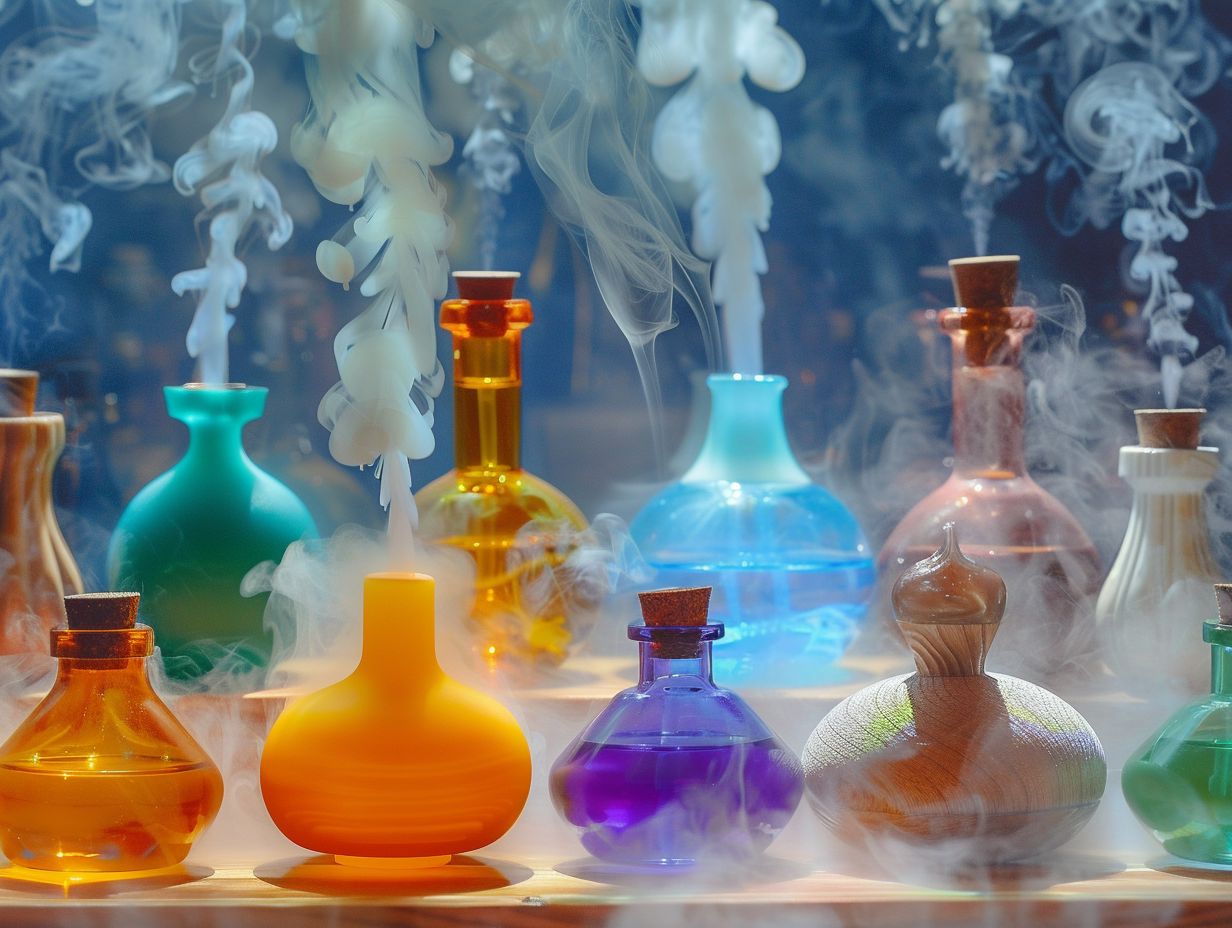
Aromatherapy diffusers can also act as natural insect repellents by dispersing scents that insects find unpleasant. These home fragrances not only create a pleasant environment but also help keep insects at bay.
Some of the scents that are particularly effective in repelling insects include citronella, peppermint, lemongrass, and eucalyptus. Citronella, derived from the lemongrass plant, is known for its mosquito-repelling properties, while peppermint and eucalyptus are effective against ants, spiders, and other common household pests. Lemongrass, with its fresh citrus scent, is also a popular choice for keeping insects away. By using these essential oils in your aromatherapy diffuser, you can deter unwanted bugs naturally without the use of harsh chemicals.
Enhances Cognitive Function
Aromatherapy diffusers can enhance cognitive function by improving focus, concentration, and mental clarity. Using a specific aroma diffuser, such as NEOM, can promote cognitive enhancement and productivity.
NEOM diffusers, infused with essential oils like rosemary and peppermint, have been found to stimulate the brain, aiding in better cognitive performance. The olfactory system plays a vital role in these benefits, as the aroma molecules trigger responses in the brain. The use of essential oils in diffusers can help reduce stress and anxiety, further sharpening cognitive abilities. By creating a serene environment, diffusers support mental alertness and memory retention, contributing positively to overall cognitive function. Aromatherapy diffusers can be essential tools in enhancing cognitive abilities and boosting productivity in various settings.
Aids in Pain Relief
Aromatherapy diffusers can aid in pain relief by targeting specific issues such as joint pain and muscle tension. Essential oil blends like peppermint or eucalyptus are known for their analgesic properties.
The effectiveness of essential oils in managing pain has been attributed to their anti-inflammatory and analgesic qualities. Peppermint oil, for example, contains menthol, which provides a cooling sensation that can help alleviate discomfort in sore joints and muscles. Eucalyptus oil, on the other hand, has been traditionally used for its ability to reduce swelling and improve circulation, offering relief from muscle tension.
Supports Immune System
Aromatherapy diffusers can support the immune system by boosting immunity and fighting off pathogens. Inhaling essential oils with immune-boosting properties can help maintain overall health and well-being.
Essential oils such as Tea Tree, Eucalyptus, and Lavender are known for their immune-enhancing qualities. These oils can aid in reducing inflammation, clearing congestion, and providing antibacterial and antiviral effects. When diffused into the air, these essential oils can help to cleanse the environment and promote respiratory health.
How to Use Aromatherapy Diffusers Safely?
Using aromatherapy diffusers safely is essential to maximize their benefits and prevent any potential risks. It is important to follow specific safety tips to ensure a positive and safe aromatherapy experience.
One crucial safety tip is to always dilute essential oils before use. Most essential oils are highly concentrated and can cause skin irritation or sensitization if applied directly. It is recommended to mix essential oils with a carrier oil before applying them to the skin.
Proper ventilation is another key aspect of safe aromatherapy diffuser usage. Ensure that the room where the diffuser is placed has good airflow to prevent any buildup of essential oil vapors, which can cause respiratory issues in some individuals.
It is important to keep diffusers out of reach of children and pets to avoid accidental ingestion or spillage. Always read the manufacturer’s instructions and follow recommended usage guidelines to maintain a safe environment while enjoying the benefits of aromatherapy.
What Are the Best Essential Oils to Use in Aromatherapy Diffusers?
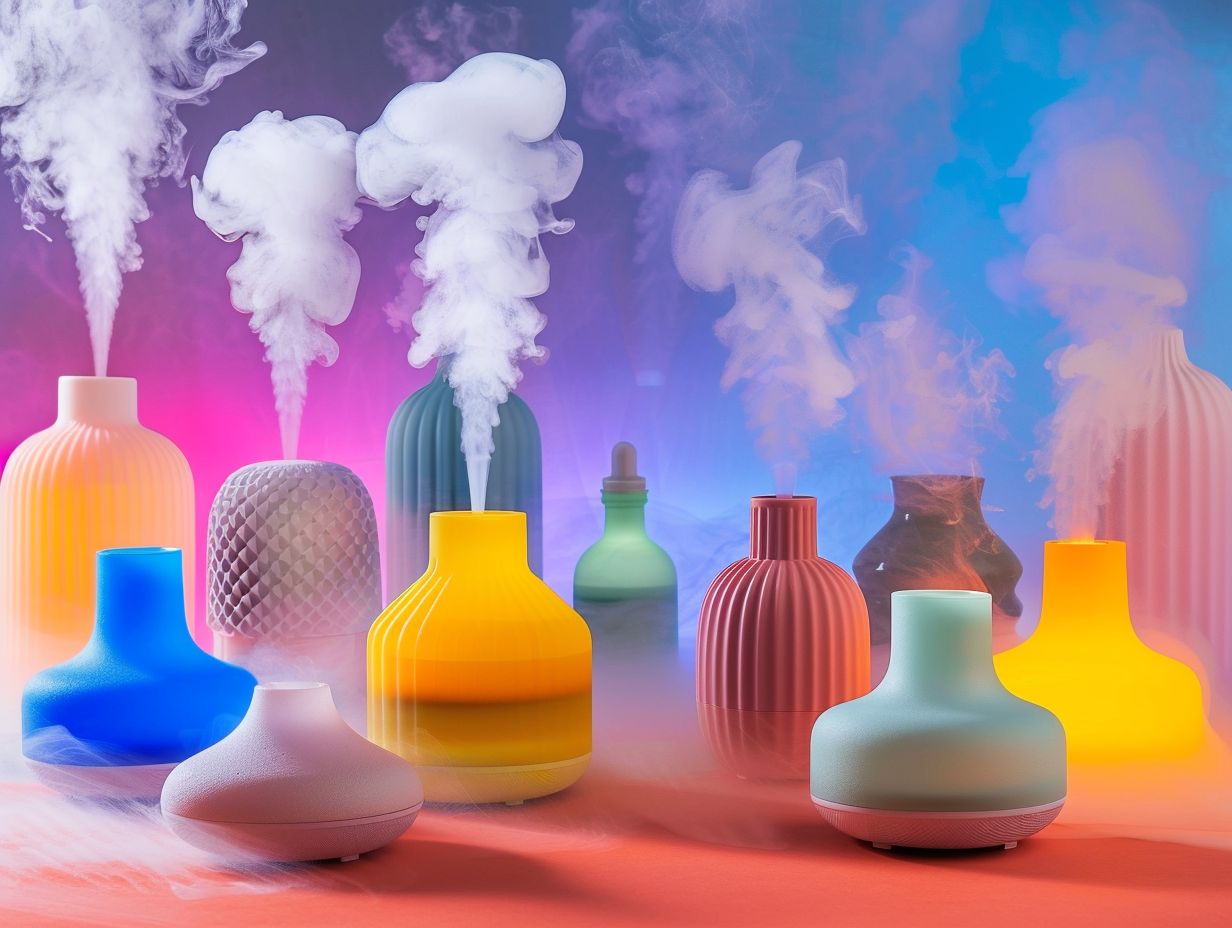
For a calming and relaxing atmosphere, lavender oil is a popular choice known for its soothing aroma and stress-relieving properties. Peppermint oil is invigorating and ideal for boosting energy and clearing the mind. If looking to purify the air and enhance focus, lemon oil is a refreshing option.
Tea tree oil is renowned for its antibacterial and antiviral properties, making it a great choice for promoting a healthy environment. Eucalyptus oil is well-known for its ability to ease respiratory issues and support clear breathing.
Lavender
Lavender is a popular essential oil known for its calming and relaxing properties, making it ideal for promoting relaxation and overall well-being. Its soothing scent can help reduce stress and anxiety levels.
When used in aromatherapy diffusers, lavender essential oil can create a tranquil atmosphere that eases the mind and encourages a restful night’s sleep. The gentle aroma of lavender permeates the air, providing a sense of calmness and serenity. Plus its calming effects, lavender oil is also believed to have antibacterial and anti-inflammatory properties, making it a versatile choice for promoting both mental and physical well-being.
Peppermint
Peppermint essential oil is invigorating and refreshing, making it effective for alleviating muscle tension and providing pain relief. Its cooling sensation can also help improve focus and concentration.
When used in aromatherapy diffusers, peppermint essential oil can help create a stimulating environment that promotes mental alertness and clarity. Plus its benefits for muscle relaxation, this essential oil is known for its ability to reduce headaches and migraines due to its analgesic properties.
The aromatic compounds in peppermint oil have been shown to positively influence cognitive function, memory retention, and overall brain health. Whether used on its own or in combination with other essential oils, such as lavender or eucalyptus, peppermint oil can be a versatile tool in promoting well-being and relieving discomfort.
Eucalyptus
Eucalyptus essential oil is commonly used to relieve respiratory issues and support the immune system. Its decongestant properties can help clear airways and promote easier breathing.
Eucalyptus essential oil is lauded for its versatile applications in aromatherapy diffusers, offering not only physical but also mental benefits. When diffused, the oil can help alleviate symptoms associated with respiratory conditions such as coughs, colds, and sinus congestion, making it a go-to choice for those seeking natural remedies. Plus aiding respiratory health, eucalyptus essential oil is known to possess antimicrobial properties that can bolster the immune system, helping the body fend off infections and illnesses.
Lemon
Lemon essential oil is uplifting and energizing, making it a great choice for enhancing mood and promoting overall well-being. Its cheerful scent can help uplift spirits and create a refreshing atmosphere.
When used in aromatherapy diffusers, the fresh and citrusy aroma of lemon essential oil can instantly brighten a room, fostering a sense of positivity and joy. Its mood-enhancing properties can help alleviate feelings of stress, anxiety, and fatigue, providing a natural remedy for uplifting one’s spirits. The antimicrobial properties of lemon essential oil can purify the air, creating a cleaner and fresher environment. This aromatic oil is also known to boost mental clarity and focus, making it a versatile choice for enhancing overall well-being.
Tea Tree
Tea Tree essential oil is renowned for its skincare benefits and natural antiseptic properties. It can help promote healthy skin, fight off infections, and support overall skin health. “
When used in aromatherapy diffusers, the Tea Tree essential oil releases a refreshing scent that not only relaxes the mind but also helps clear the respiratory system, promoting easier breathing and potentially boosting immunity. Its antibacterial and anti-inflammatory properties make it an excellent choice for targeting acne, eczema, and other skin conditions. The oil’s ability to soothe irritation and reduce redness can bring relief to those with sensitive skin. When diffused, Tea Tree essential oil contributes to a healthier indoor environment by purifying the air and combating germs. Your skin will thank you for incorporating this versatile oil into your daily routine.
Frequently Asked Questions
What Are the Benefits of Aromatherapy Diffusers?
What exactly is an aromatherapy diffuser?
An aromatherapy diffuser is a device that disperses essential oils into the air to create a pleasant aroma and provide therapeutic benefits.
How do aromatherapy diffusers work?
Aromatherapy diffusers work by breaking down the essential oils into tiny molecules and dispersing them into the air, which allows the oils to be easily absorbed by the body for their therapeutic effects.
What are the benefits of using an aromatherapy diffuser?
Aromatherapy diffusers can provide a range of benefits, including improving mood, reducing stress and anxiety, promoting relaxation, enhancing sleep, and boosting the immune system.
Can aromatherapy diffusers help with respiratory issues?
Yes, certain essential oils used in aromatherapy diffusers can help relieve respiratory issues such as congestion, coughing, and allergies by opening up airways and reducing inflammation.
Are there different types of aromatherapy diffusers?
Yes, there are several types of aromatherapy diffusers, including ultrasonic diffusers, nebulizing diffusers, heat diffusers, and evaporative diffusers, each with their own unique benefits and features.
How do I use an aromatherapy diffuser?
To use an aromatherapy diffuser, simply add a few drops of your desired essential oils to the diffuser, fill it with water, and turn it on. Choose your preferred settings (such as mist intensity or timer) and enjoy the therapeutic benefits of the diffused oils.

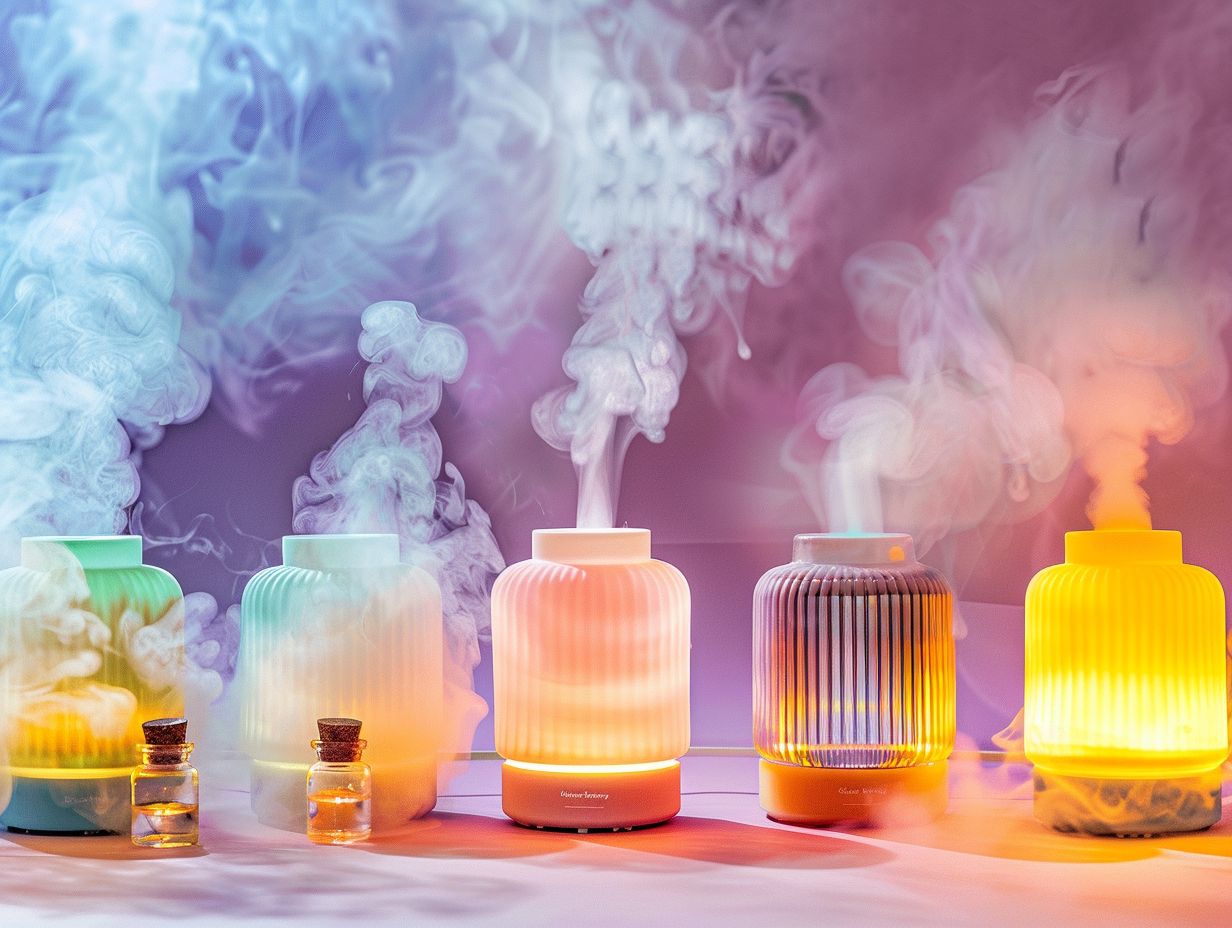
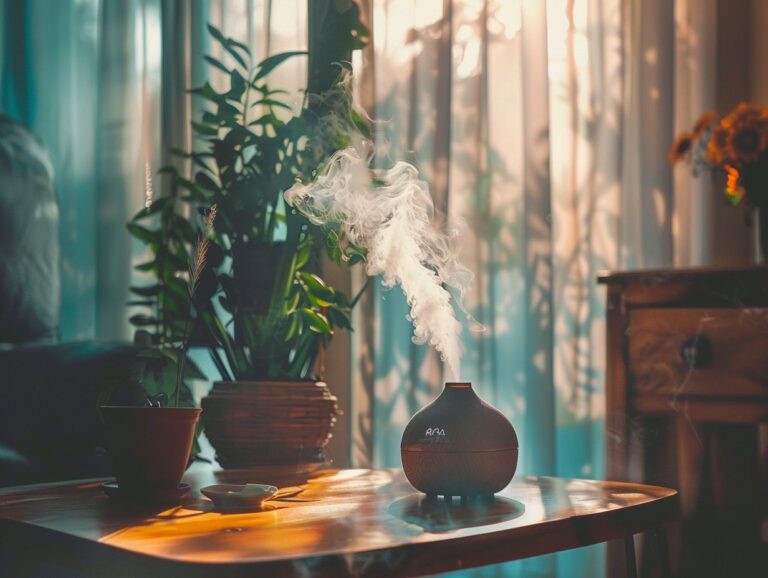
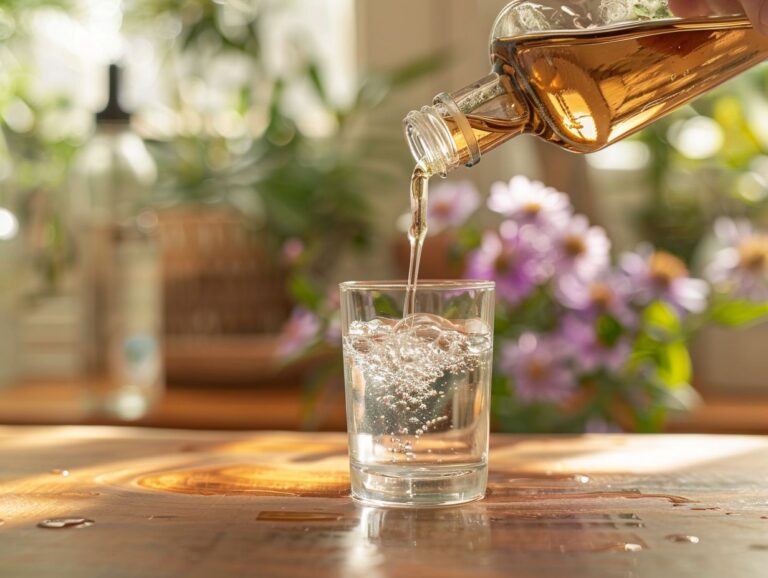
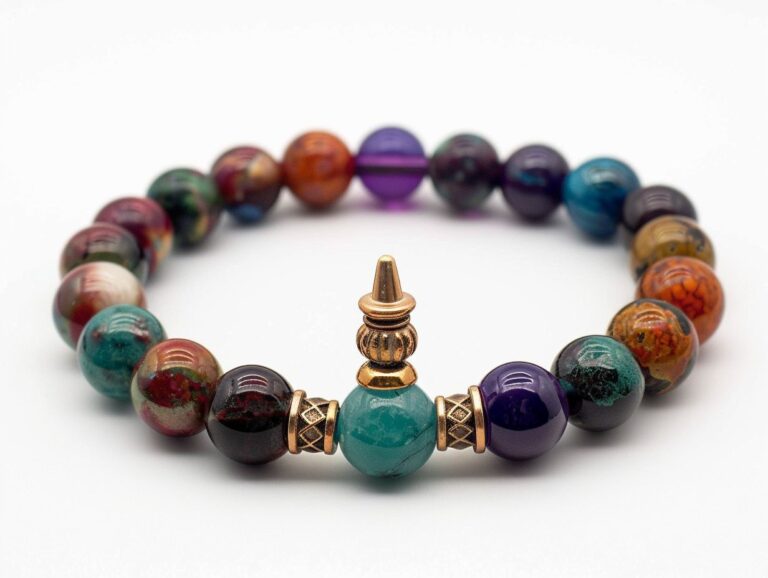
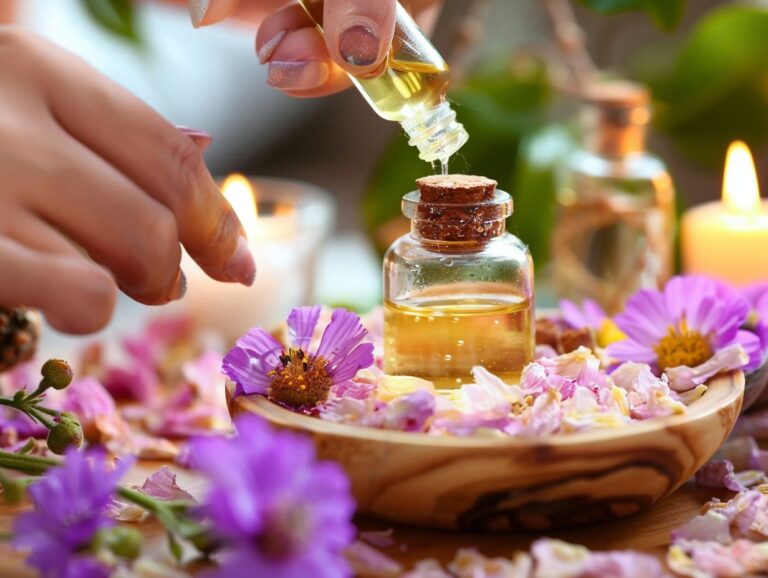


One Comment